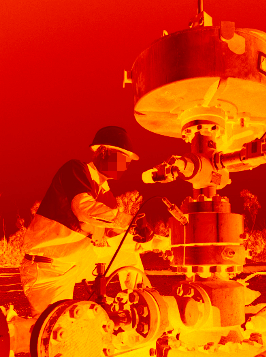Gas regulation found lacking
 An official report has questioned compliance in Queensland’s CSG regulation.
An official report has questioned compliance in Queensland’s CSG regulation.
A report by the Queensland Audit Office tabled in State Parliament looked at the two industry regulators - the Department of Natural Resources, Mines and Energy (DNRME) and the Department of Environment and Science (DES). It also audited the Gasfields Commission, which is responsible for providing oversight and advice to stakeholders.
“[The DNRME and DES] do not identify coal seam gas activities separately from their other regulatory activities, do not coordinate their planning and regulatory activities, and have disparate systems and data practices,” the audit report found.
“These limitations make it difficult to assess the overall effectiveness of the regulatory framework specific to coal seam gas activities.”
The current legislative framework does not consider fracking gas wells on their own to be “environmentally relevant”.
“Hydraulic stimulation/fracturing is not an environmentally relevant activity on its own under the Environmental Protection Regulation and, therefore, DES does not report on it separately,” the audit said.
The controversial technique of fracking involves pumping a high-pressure mixture of water, sand and chemicals down gas wells to release trapped gas.
Commercial CSG production is Queensland’s second biggest export commodity, valued at $15.2 billion.
The auditor-general also found a lack of transparency and oversight of the CSG industry.
The Gasfields Commission Act 2013 requires the Gasfields commission to “review the effectiveness of Government entities in implementing regulatory frameworks that relate to the onshore gas industry”.
“The commission is not performing this legislated oversight function,” the audit said.
“At present, no-one is providing transparency and certainty that regulators of the coal seam gas industry are performing their roles effectively.”
In fact, even what should be straightforward information about the number of petroleum leases and environmental authorities is not available.
“It is not possible to identify an accurate and reliable number of audits or inspections the regulators have undertaken of the coal seam gas industry,” the audit said.
“The regulators do not identify coal seam gas activities as distinct from other petroleum and gas activities in their databases.
“Consequently, we and the regulators were unable to verify the complete authorities and leases for coal seam gas activities with any degree of confidence.”
The DNRME says it is moving to a new online system that allows more specific identification of gas-related activities.
The audit also found that landholders are being disadvantaged in negotiations with gas companies.
“Some landholders say they have been unable to obtain information relevant to their land from the two regulators and from industry,” the audit said.
Landholders say they cannot access the same level of information as the gas companies.
“This puts them at a disadvantage when negotiating with industry,” the audit said.
The audit called on the DNRME, DES and Gasfields Commission to “facilitate ways to further enhance the exchange of information between industry, Government and landholders in situations where landholders have not been given the information to make an informed decision”.
The two regulators say they will accept all recommendations.
“The DES supports the recommendations in the report and is committed to continuous improvement in its regulatory approach to all industries, including the coal seam gas industry,” DES Director-General Jamie Merrick said.
“The department has committed to a number of actions … that will provide for increased information sharing between relevant agencies and improved transparency of the department's regulatory approach for both industry and the community.”
DNRME director general James Purtill said Queensland’s authorities are “leaders in onshore petroleum regulation”.
“DNRME acknowledges the report's conclusions that greater data sharing, particularly with DES and the Gasfields Commission Queensland (GFCQ) will lead to improved regulatory outcomes for the departments, industry and community stakeholders,” he said.
“DNRME will work closely with DES and the GFCQ to implement the report recommendations.”
The Gasfields Commission Queensland says it has “already embarked on a major renewal program”.
“The purpose of this program is to ensure the Commission delivers all of its legislative functions and engages effectively with key stakeholders,” it said.








 Print
Print